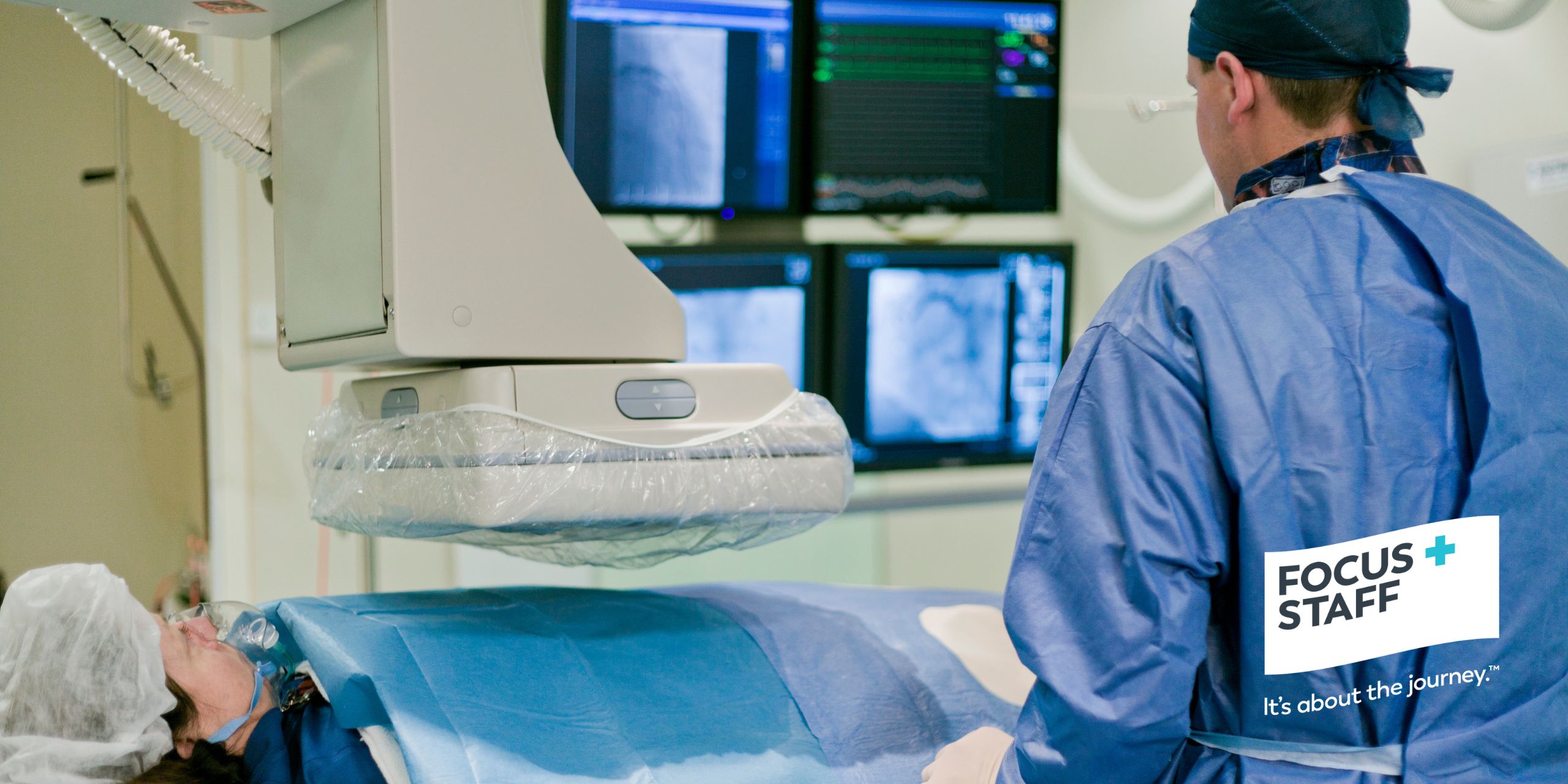Clarisse Celis | March 4th, 2025
A career as a Cath Lab Technologist offers a unique blend of technical expertise and patient-centered care. These professionals play a critical role in cardiac health, assisting with life-saving procedures in the fast-paced environment of the cardiac catheterization lab. From operating advanced medical equipment to ensuring patient safety, Cath Lab Techs are at the heart of cardiovascular care.
If you’re interested in making a real impact on patients’ lives while advancing your career, this guide will walk you through everything you need to know about becoming a Cath Lab Tech—from education and certification to career pathways and beyond.
What Does a Cath Lab Tech Do?
Cath Lab Techs are vital members of the healthcare team, working closely with cardiologists to perform diagnostic and interventional cardiac procedures. Their responsibilities range from preparing patients for procedures to monitoring vital signs and assisting with catheter insertions. These professionals must master both technical precision and compassionate patient care.
Key duties include:
• Operating and maintaining complex medical imaging equipment
• Assisting physicians during catheterization procedures
• Ensuring patient comfort and monitoring vital signs
• Maintaining sterile environments and following strict procedural protocols
A deep understanding of cardiovascular anatomy and a calm demeanor under pressure are essential for excelling in this role.
Steps to Becoming a Cath Lab Tech
A successful career as a Cath Lab Tech requires a combination of formal education, clinical training, and professional certification. Here is a step-by-step guide to get you started:
1. Educational Requirements
To pursue a career as a Cath Lab Tech, you will typically need an Associate’s degree in Cardiovascular Technology, Radiologic Technology, or a related healthcare field. These programs, usually lasting two years, provide foundational knowledge in cardiovascular care and hands-on clinical training.
For those seeking leadership roles or advanced practice areas, pursuing a bachelor’s degree in a healthcare-related discipline can open new career pathways.
Recommended coursework includes:
• Cardiovascular anatomy and physiology
• Medical imaging technology
• Patient care and safety
• Radiation protection
2. Obtain Required Certifications
Certification is a crucial step for establishing credibility and ensuring you meet industry standards. The primary credential for Cath Lab Techs is the Registered Cardiovascular Invasive Specialist (RCIS) certification, administered by Cardiovascular Credentialing International (CCI).
Eligibility for the RCIS exam typically requires:
• Completion of an accredited cardiovascular technology program OR
• One year of professional experience in invasive cardiovascular procedures
Additional certifications to consider include:
• Registered Cardiac Electrophysiology Specialist (RCES) for specialized training in cardiac rhythms
• American Registry of Radiologic Technologists (ARRT) certification for those with a background in radiologic technology
3. Meet State Licensing Requirements
Licensing requirements for Cath Lab Techs vary by state. While some states have no formal licensure, others require specific applications, fees, and continuing education for license renewal.
For those considering travel positions, maintaining licensure in multiple states can increase job flexibility and career opportunities.
4. Gain Hands-On Clinical Experience
Practical training in a real-world cath lab setting is vital. Many educational programs include clinical rotations that allow aspiring Cath Lab Techs to learn directly from experienced professionals. This hands-on experience is essential for developing technical skills and understanding procedural workflows.
Employers highly value candidates with robust clinical backgrounds, as these experiences directly translate to on-the-job success.
Essential Skills for Cath Lab Techs
Thriving as a Cath Lab Tech requires a combination of technical acumen and interpersonal skills. Key competencies include:
• Proficiency in operating medical imaging equipment
• Strong attention to detail and ability to follow complex protocols
• Effective communication with patients and medical teams
• Critical thinking and quick decision-making during procedures
Cath Lab Tech Job Outlook and Salary
The demand for Cath Lab Techs is on the rise, driven by an aging population and the growing need for advanced cardiovascular care. According to the U.S. Bureau of Labor Statistics, employment for cardiovascular technologists is projected to grow by 11% from 2023 to 2033, faster than the average for all occupations.
Cath Lab Techs earn competitive salaries, with pay ranging from $33,950 to $102,000 annually, depending on location, experience, and specialization. Travel Cath Lab Techs, who work short-term assignments in different regions, can earn between $1,800 and $3,400 per week, making this an attractive option for those seeking adventure and career growth.
Launch Your Career as a Travel Cath Lab Tech with Focus Staff
If you’re ready to take the next step in your Cath Lab Tech career, Focus Staff is here to help. We specialize in connecting talented healthcare professionals with rewarding travel assignments across the country. As a travel Cath Lab Tech, you’ll have the opportunity to explore new locations, gain diverse clinical experiences, and enjoy competitive pay and benefits.
Start your journey today by visiting jobs.focus-staff.com and apply for your next Cath Lab Tech position. Your future in cardiac care starts now!
If you aren’t already heading to your next assignment, let’s chat! 😊
Email [email protected] to get connected with a recruiter!



